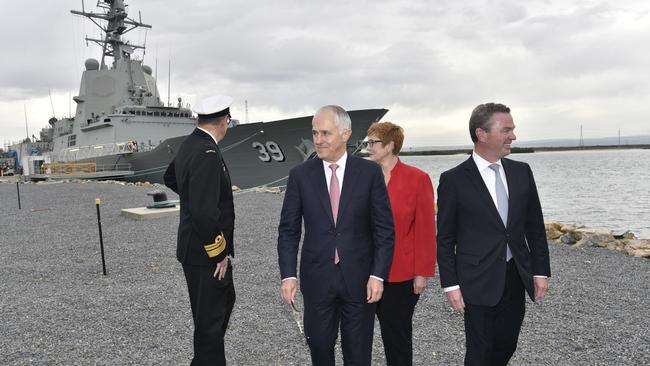Shipbuilders ASC to build non-combat ships for export
ADELAIDE shipbuilders ASC are poised to start exporting to the world as their role in the nation’s $89 billion program remains unclear.
SA News
Don't miss out on the headlines from SA News. Followed categories will be added to My News.
ADELAIDE shipbuilders ASC are poised to start exporting to the world as their role in the nation’s $89 billion program remains unclear.
In a plan to rescue and even create jobs at Techport, ASC shipbuilding chief Mark Lamarre will tell an international conference in Sydney on Tuesday that they are in discussions about contracts that could create hundreds of jobs.
It is understood they are looking at exporting naval ships as well as coast guard ships.
The plan comes as Prime Minister Malcolm Turnbull today announces that Adelaide-based Saab Australia will develop the “brains” for non-combat ship projects, in a multi-billion dollar investment.
This means that SA technology will be used to shoot down missiles, boosting the nation’s defence against North Korea.
ASC is at risk of being sidelined in the $30 billion Future Frigates project because the request for tender makes it clear that ASC — and WA shipbuilders Austal, which it have an agreement with — do not have to be used.
That contract will go to one of three tenderers — BAE, Fincantieri or Navantia. All have said they will still use the trained Adelaide workforce.
However, it is not clear how many ASC workers will be left by the time that project kicks in, nor are they all guaranteed jobs.
Mr Lamarre will tell PACIFIC 2017 that they are exploring possible projects with a range of designers and customers.
It is understood they are looking at exporting naval ships as well as coast guard ships.
“We have identified real and present export opportunities, appropriately timed before the Future Frigate program, to aid workforce transition from the AWD to the future,” he is set to say.
“We expect to formally announce teaming agreements in the near future for an export opportunity.
“If successful, depending on the number of contracts, we believe we could achieve a jobs uplift of between 300 and 600 positions and help Australia ride through the so called ‘Valley of Death’.”

Despite the continuous shipbuilding plan, the industry is still concerned about that “Valley of Death”. As work on the Air Warfare Destroyers winds down, jobs are disappearing.
The workforce will increase with the Offshore Patrol Vessels from 2018, and even more once the Future Frigates project begins in 2020. However, there are still concerns about skills shortages. Mr Lamarre will say he has 1300 shipbuilding staff “raring to go”.
“By leveraging our existing capability, we can turn the Valley of Death into a ‘mountain of opportunity’,” he plans to say.
State Defence Industry Minister Martin Hamilton-Smith on Monday night spoke at one of the conference opening dinners.
He said federal spending on naval ships would be “returned many times over” by building up the workforce and its competency, as well as technological advancements and other spin-offs.
He said SA had the capability to finish the major warship projects, thanks to improvements at ASC.
ASC was heavily criticised for cost and schedule blowouts on the AWDs, but has improved its productivity to world standard.
Some industry insiders believe its past performance is the reason the frigates tender almost urges bidders to ignore them.
“ASC made massive improvements in productivity with the AWD project, with significant efficiency gains by applying lessons learned from the first ship to the second ship; and again from the second ship to the third ship,” Mr Hamilton-Smith said.
Federal Defence Industry Minister Christopher Pyne has been emphasising Australia’s opportunities to export ships, and the Federal Government says ASC workers will be “first in line” for jobs.
Mr Pyne has spruiked the idea of an export industry stemming from having a homegrown defence industry.
He says building even more ships will strengthen the industry, return money to the taxpayer, and create Australian jobs.
There are still many who are concerned, however, that using the UK’s BAE, Italy’s Fincantieri, or Spain’s Navantia as the frigate builder as well as designer will hinder Australia’s role as an exporter.
The tender for the job said “in particular”, there was no pressure to use ASC.
People will fly from all over the world to attend the Australian conference, including many from French shipbuilders Naval Group, who have won the contract to build the $50 billion Future Submarines.
“We are completely focused on partnering with the Department of Defence and Lockheed Martin Australia to grant full sovereignty and regional superiority with the delivery of the Future Submarine Program — one of the largest defence capital investment programs in Australia’s history and a truly national endeavour,” chief executive officer Herve Guillou said.
The three-day conference will host top brass from the Royal Australian Navy as well as a range of shipbuilding industry experts.


